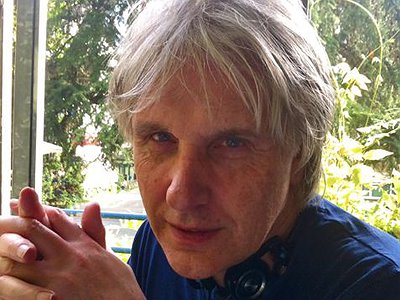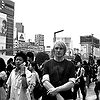When did you start working as a music journalist - and what or who were your early passions and influences?
I used to listen to pirate radio in the '60s before the BBC took over. There was a French radio station I could pick up only late at night with an American DJ called Emperor Rosko, who was kind of like a French-speaking Wolfman Jack. Then when radio 1 started in '67, John Peel used to have a show called The Perfume Garden.
Pete Drummond who was a DJ around the same time, also had an influence on me. He had a 2 hour show of uninterrupted music on a Friday night called The Sequence. It was all mixed together and he had this effect on his voice that made him sound like a computer. His way of doing things stuck in my mind.
What are your main impulses to present music to an audience?
People often assume that when you play music on the radio that you're playing your favourite records, which is not the case at all. Well it might be so in the first few months but what then? To me it was always interesting the way you set things up. I like to use the analogy 1+1 makes 3, which is the idea that the way you play things together creates something else. The whole programme's important, it's not about specific songs. For example if you play a heavy rap track and follow it with a Randy Newman song, the Newman song will sound completely different if you'd heard another ballad before hand. It comes from being curious and wanting to surprise your listeners and yourself at the same time.
Back when I used to do live shows, I'd be sitting there with three record players, choosing which song to play next. Sometimes I wouldn't be able to decide which track to play until seconds before. Sometimes you'd play something and you'd know instantly that it was the wrong track and sometimes after 30 seconds I'd take it off saying it was the wrong choice. It's difficult to know what you're trying to achieve because you don't really know yourself until it's finished. I enjoyed the spontaneity though.
I had a lecturer once at college, an old-school BBC guy with a double-breasted blazer who used to come in to the classroom and write 'in radio your audience is an audience of one'. It's an intimate medium. But today, some DJs broadcast as if they're addressing thousands of people in a stadium or the whole town and the intimacy gets lost.
What do you personally consider to be the incisive moments in your journalistic work and/or career?
Nothing specific I think. I'm not one of those people who goes after things, which isn't necessarily a good trait to have. I never set out to be a DJ, the opportunity just kind of arose and it turned out to be something I was good at. Unlike TV production, you could work on radio alone, which is the main reason I chose it.
In retrospect I can say that a lot of my big moments have come by chance. In about 1972 I was sent to DFBS to fill a maternity position. I was 21 and arrived in Cologne in February, the day after Carnival. There were piles of sick everywhere and it was horrible. I worked for 2 years there doing everything and learning the ropes for 80 hours a week. I had to read out the local announcements in German with the BBC feed in one ear, and I learned how to time myself during that period. I would know exactly when to put a record on so it finished exactly at the right time, or at the end of the programme.
I've always looked at the positives in the opportunities that I got, whether it's radio or TV. For example I got a show that had only 25 minutes to report for a music show. I had to make the best with what I had and it meant letting go of so much good stuff, but I learned how to make it work.
Radio has been declared dead on many occasions, yet it continues to prosper. What has been its ongoing appeal and value, would you say – both to listeners and to you personally?
I think the fact that it's an intimate medium is one of the reasons it will never die. Especially in the culture of today, sometimes it's really nice to feel like someone is talking just to you. I love listening to the test match special because it's hasn't changed in 50 years. It's the ideal radio, where you've got people who know what they're talking about, and like what they're talking about, they're enthusiastic about it and they're able to convey their enthusiasm in the show. That to me, is what radio has always been and should be. You don't need to sex it up, you just need people who know what they're talking about and who can share their enthusiasm. It's probably easier to do this on radio than it is with any other medium, compared to say, writing or TV. There's less distractions with radio. It's just people telling stories really and radio still fulfils that function. Everyone can relate to it. The whole human culture is based on telling stories and passing on information through talking. It's a way of passing things on. I once asked Keith Richards what he would like to have on his tombstone. He didn't have to think twice he said 'it's simple, "he passed it on"'. He passed it on. Muddy Waters passed on what he did to me, and if what I did can be passed on to someone else then that's fine.'
You're a medium for passing things on. The problem starts when you think you're the star. So many of the musician's I've talked to have said the stuff's all there, they're just picking up on it, they're receivers of information. They don't know where it comes from.
What are the respective tasks of print- and radio journalism from your point of view? Do you see them as separate worlds or as complementary?
I think they're very, very different. Because of the internet there are so many people writing online and that reflects on journalism. There's an interaction with the Internet. Things get printed immediately, there's no waiting for publication dates etc. It's happening right now. With print that was not always possible, there was always a delay.
Live radio used to be the only medium that was like that, so reactive, but now with the Internet, you've got social media and publications that put it all out as it's happening. But the problem with radio is that too many people are trying to influence what it should be doing. To me it's pretty simple, you've just got to get someone who's good at what they do and sit them down and let them do it. If it's good you'll get listeners eventually.
Print and radio will always be different. I think the important thing is to always look at the advantages of the medium and work with that. What can you do with radio that you can't do with print? It's kind of what I'm doing now, I'm experimenting with how many words I need to create an atmosphere, you don't have to talk for a long time. I'm trying more to blend in to this hour of sound. The meaning of the words don't always have to be the focus, but rather the sound of the words. Radio logic is different to print logic. Radio logic is not always determined by what the person is saying but the lyrics and music all come into play.
I don't like to force my opinion on people either. There are so many DJs and journalists out there who are determined to make their listeners think 'this is a great song'. I think listeners should make up their own mind, so I try to keep my presence out of the picture as much as I can. I try to take myself out of the story, so it's about the story, not me.
I did an interview once with Jackson Brown that I never forgot. I asked him if he worries about exposing too much of himself, because his songs are always so personal. Where do you draw the line about how much you reveal? He said, 'absolutely not. I can never reveal enough. The whole point of what I'm trying to do is, if you reveal so much you then reach a point inside of you that is a universal thing. Other people will be thinking "this is no longer Jackson Brown singing, he said what I've thought all along but couldn't say for myself"'. The point is to get so personal that you become universal.
It's very hard to do because if you get it wrong it just becomes egotistical. But if you can get to that point where people are not just hearing it they're listening. In German there are two words, begreifen and verstehen. Begrifen means you just know what it's about without thinking about it and verstehen means you're using your head to think about something, to understand it.
To achieve universality, if you're good at what you do, nobody needs to know you've done it. You want the audience to see the end result without knowing what's gone on in the background to get that result. When I was back in college I did an interview with John Cleese and he said "one of the most important things for us is when we've completed something you should never see the scaffolding. You should never see how it was constructed." In comedy this is incredibly important. He said "what you would see on TV with Monty Python was at the most 5% of our ideas. 95% ended up in the bin. We would be 8 people and if one person didn't like it, it wouldn't get through."




